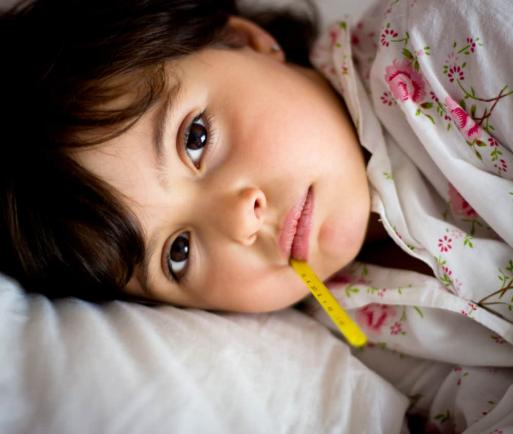
As a mother, it's always sad for me to see my children endure illnesses, but sickness is a part of life. Kids don't have much control over what happens to them, and sometimes they have a hard time when they don't feel well. You'll need a lot of patience and love as you care for your kids while they battle colds and viruses. These six ideas will help make your children more comfortable.
1. TLC
When my daughter had an especially bad stomach virus recently, I told her she needed a little "TLC." I then explained to her that TLC stands for "tender loving care." No matter how small or big the illness, you can comfort your children with love. There's something very soothing about having your forehead caressed or your back rubbed when you don't feel well. Make children comfortable with a favorite blanket or extra pillow if they have to stay in bed. Even if you can't stay by them all day, check in often and offer sympathy.
Younger children may need your constant attention which can be draining. Instead of feeling frustrated, try to feel close to your children and enjoy serving them. If your child is chronically ill, you will need a strong support system to help both you and your child.
2. Quiet activities
When kids are sick, they need rest. It's hard to keep active kids down, although some illnesses make kids sleepy as they recover. If your child is getting bored of being still, offer quiet activities. Reading books, coloring, drawing, playing on electronic devices or watching movies are great ways to pass time. Things to do together include playing card games, drawing each other's portraits, doing simple crafts or playing with stuffed animals and small toys. My children love having extra screen time, so I don't feel too guilty about keeping them occupied while resting.
3. Restful environment
It's a good idea to keep sick kids away from the rest of the family as much as possible. One reason is that they are less likely to spread germs to others. Another reason is that some symptoms, like headaches, can be aggravated by noise and lights. Kids who are in a quiet place are more likely to rest and give their immune systems a chance to work. It's hard to stay in the same place for days at a time, so if your child is feeling well enough to move, change her environment to keep her from boredom.
4. The right foods
Kids might not feel like eating when they are sick, but food is important to fuel the body and help kids heal faster. For colds, mild foods like soup, gelatin, applesauce and yogurt are well-tolerated. As kids recover from stomach viruses, many parents use the BRAT diet: bananas, rice, applesauce and toast. However, as soon as kids feel well, return them to a normal diet full of whole grains, healthy fats, protein and plenty of fruits and vegetables.
5. Hydration
It's tricky to know how much water to have your children drink, particularly if they have a stomach virus. However, hydration is important in keeping kids healthy. If your child has a cold or fever, encourage him to drink water regularly. You can also offer weak juice or a beverage containing electrolytes. Older children might like herbal teas. Ginger is good for an upset stomach, and lemon and peppermint are good for colds. Sweeten teas with honey or sugar if needed.
If you child is throwing up, be careful about offering liquid as it might cause more vomiting. When his stomach begins to calm down, offer very small amounts of water - just one sip to start - until you make sure your child won't vomit again. Ice chips and popsicles can also help kids stay hydrated, but too much sugar is not good for sick kids. If you are concerned about dehydration, which can be very serious, watch for signs and consult your child's physician.
6. Medication and remedies
Your doctor is the best person to help you know what medicines and doses are appropriate for your child. Some simple home remedies can help comfort your child when medicines and rest aren't enough. For kids over the age of 1, a spoonful of honey can soothe a sore throat or ease a cough. You can try a chest rub to clear up congestion. A humidifier can help children sleep better if the air is dry and they are suffering from respiratory illnesses, but it must be cleaned and used properly.
Parents work hard to keep children healthy by practicing good hygiene, but when sickness strikes, let these guidelines help you comfort your sick child. With a little rest and TLC, she'll be back to running and playing soon. Then you'll be the one who needs a nap.

